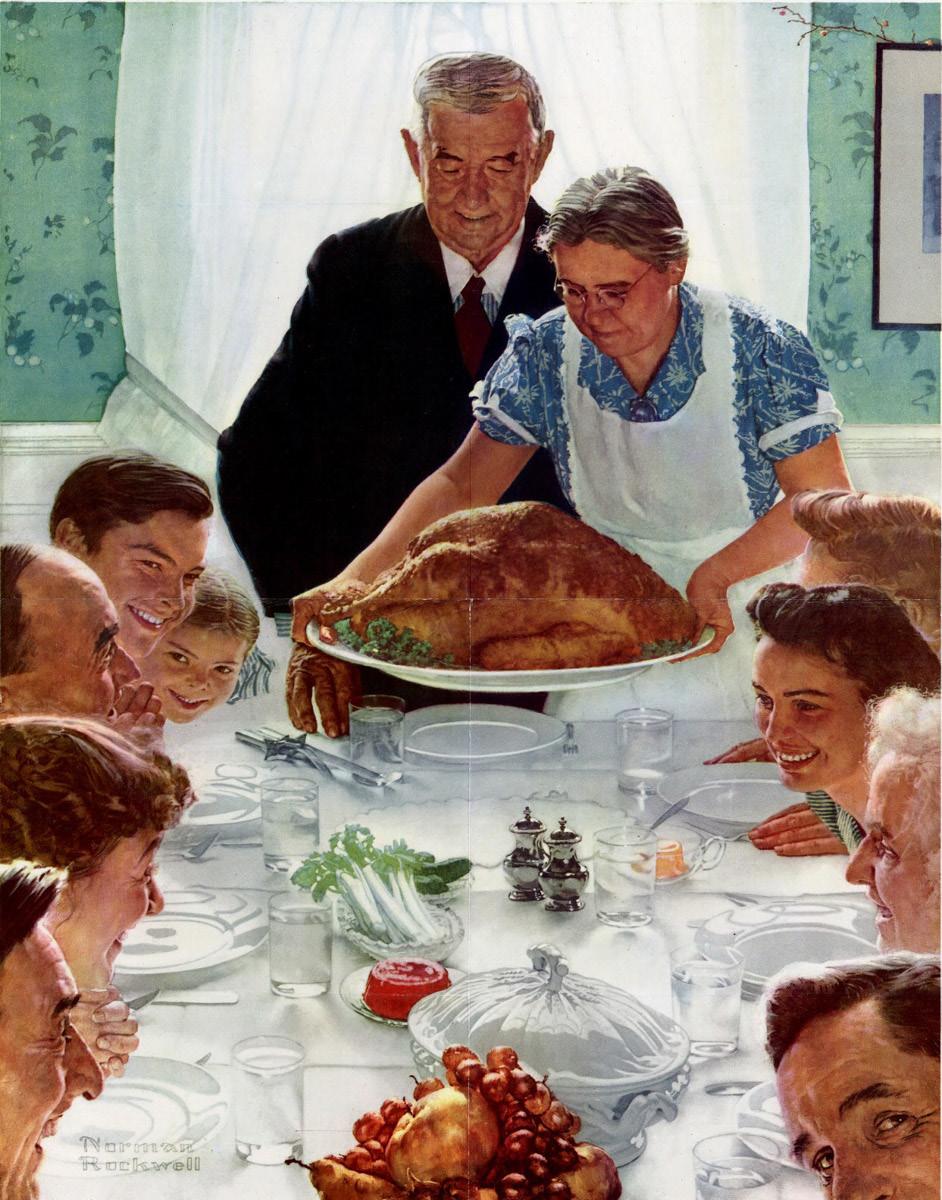
7 minute read
Gratitude costs us nothing, but it benefits everything even when times are tough. See Opinion on
OPINION
Gratitude costs nothing, benefits everything
By Matthew Prosser
When many of us think about Thanksgiving, typically what we think of are cultural touchstones such as family, friends, football, and an all-too-brief moment’s peace before the mad lurch into a chaotic Christmas shopping season.
But all of that seems so broken right now. How can we be thankful when we see the raging tumult around us?
King Solomon the Wise once wrote that we should not say the good ol’ days were better than today, “For it is not from wisdom that you say this.” (Ecclesiastes 7:10) I think he understood the all-too-human tendency to romanticize the past, and think that it was better than our current time. It’s a comforting fiction.
The good ol’ days were hardly good, it doesn’t matter how far back you go. Not to the sepia-tinged halcyon days of my youth, or whatever idealized past you might remember. It doesn’t matter if you go all the way back to the Garden of Eden, you’ll still find chaos slithering down from the tree branches.
Our idyllic conception of Thanksgiving is best depicted in Norman Rockwell’s painting “Freedom From Want,” also known as “Thanksgiving,” which was created in the 1940s. For most, our modern celebration has little to do with the harvest. Few of us picked our pumpkins from the field or can say we had a good corn crop this season.
What does it mean to be thankful? The title of the painting itself: “Freedom From Want.” Ultimate fulfillment. It is the complete realization of the American Dream. To be enveloped in the comforting solace of family and loved ones; to have enough affluence not just to “pay the bills” but to afford such a festive meal. I think of those who observe this holiday alone. Or the many still in mourning for loved ones lost. Tonight millions go to bed aching with hunger, how do I dare to celebrate “Freedom From Want” when so many remain in such desperate need?
My heart is heavy to consider how many people have lost family members, spent hours worried about sick friends in the hospital, not been able to attend funerals, been laid off from their jobs, seen their businesses closed, and agonized over the manifold difficulties they endure daily. So much suffering, around our nation and the world entire. Anger and contempt. Wrath and oppression. Rage and avarice. I can hardly believe it, and I can scarcely understand it.
Now it’s the Thanksgiving season, when I’m supposed to be
PROSSER

Cost|Continued to page 8
Students need 21st-century data-literacy skills
By Steven D. Levitt Education Next

Most educators understand that school curricula must evolve as the world changes. Refusing to adapt would do a terrible disservice to students, leaving them poorly prepared for their futures. Striking the right balance is difficult, but our schools usually find a way to forge ahead, teaching more Spanish and less Latin, more Angelou and less Shelley.
But math instruction seems to resist this needed evolution. Math is viewed by some as an immutable revelation, as if Pythagoras himself chiseled the curriculum into stone tablets and brought them down from the mountaintop. Thou shalt teach synthetic division! Thou shalt master factoring higher degree polynomials!
Why this perception persists is a mystery. High school math instruction has changed before. The current gauntlet of algebra through calculus was set in the 1960s in response to Russia’s Sputnik. To win the Space Race and the Cold War, the United States needed more scientists and engineers, and a steady diet of quadratic equations and differentials was considered the best way to cultivate them. Before this abrupt shift, high school math had been evolving slowly to include algebra and Euclidean geometry, in response to changing admissions standards at selective universities. In 1926, only 10 of the 310 questions on the SAT were about math, and those questions were limited to arithmetic and basic algebra.
Today, we could be more confident in our current math curriculum if little had changed in the world since the 1960s. But that would be an absurd position to take, of course. Society has been transformed over the past six decades, and in ways that have dramatically affected how we use math in our lives. Nearly every one of us walks around with a powerful computer in our pocket, capable of making billions of calculations per second. Each day, we collectively generate enough data to fill five Libraries of Congress. And the Internet has disrupted almost everything, including our most trusted sources of information. We now must sort fact from fiction for ourselves. Do cosmetics cause cancer? Is COVID-19 a threat to a healthy 5-year-old? Was the last election stolen?
Our lives have been changed by this revolution in so many ways, including the way we work. Seven of the 10 fastest-growing jobs in America are related to data. And while most of those roles are highly technical, computing and data have seeped into everyone’s workplace. Auto mechanics used to turn wrenches. Now they plug cars into computers and interpret the results. Teachers used to give lectures and write on chalkboards. Now they record their lessons on YouTube and analyze their students’ test scores with sophisticated software. Can you imagine how often today’s children will be working with data when they come of age?
In this new world, how useful is the math we are currently teaching in our schools? To get some insight into this question, we conducted a small survey with several hundred Freakonomics podcast listeners. While this sample is far from representative, it’s fair to say the respondents are likely to be biased toward overestimating the value of today’s math, as Freakonomics fans tend to be a pretty geeky crowd.
The true power of data emerges in applications. We recommend that the data-based math course be offered early in the math sequence, so students will have opportunities to integrate data analysis into their social science, humanities, and science courses.

LEVITT
— Steven D. Levitt is a professor of economics and social sciences at the University of Chicago.


INCASE UOY MISSED IT
Trent Williams offers assistance
Trent Williams is back helping students taking dual credit courses with his tuition assistance program for the second year in a row. The goal of the program is to provide academic support to students who are historically underserved targeting at-risk and economically disadvantaged students. Students in grades 10-12 who are interested in applying will need to have the form and essay completed by November 30.
Foster uniform closet needs items
Foster Middle School needs donations for their uniform closet. They need belts, pants, coats, shirts gently used or new. Juniors and adult sizes will be accepted. Please drop those off at Foster Middle School to Alicia Johnson or reach out to her at aamjohnson@LISD.org for more information.
The Lobo Choir has been invited to perform at Carnegie Hall in March of 2023. We have been fund-raising, seeking sponsors, and students have been making personal payments. Unfortunately, out of the 78 students in the choir only 26 have been able to make all the necessary payments. If you can help with corporate sponsorships, or make a personal tax deductible donation please contact Melody McMullen at mmcmul len@LISD.org or our Booster Club at
Lobo Choir seeking sponsors
LongviewChoirBoosters@gmail.com. You can also go to the link to make a donations: https://olr.worldstrides.
net/scripts/cgiip.exe/registeronline/
paymentportallogin.html Use our trip ID #203140
Tickets available for ‘Guys & Dolls’
LHS UIL is getting ready to start
Longview High School UIL Academics is gearing up for another successful year. UIL Academics features both academic and performance contests from which students might choose to participate. The LHS team competes at the district, regional, and state levels.
The LHS Fall Theatre production of Guys & Dolls will be November 8-13 in the Mickey Melton Auditorium. Tickets are $8. The play will be performed at 7 p.m. on Nov. 8, 10, and 12. It will take place at 2 p.m. on Nov. 13. Dates are dependent upon playoff game. The performance would change to Friday, Nov. 11.
Did we miss your campus news?
Did we miss campus or organization news? Send us the pertinent information to ask@ LISD.org and we’ll include it in our next issue!



